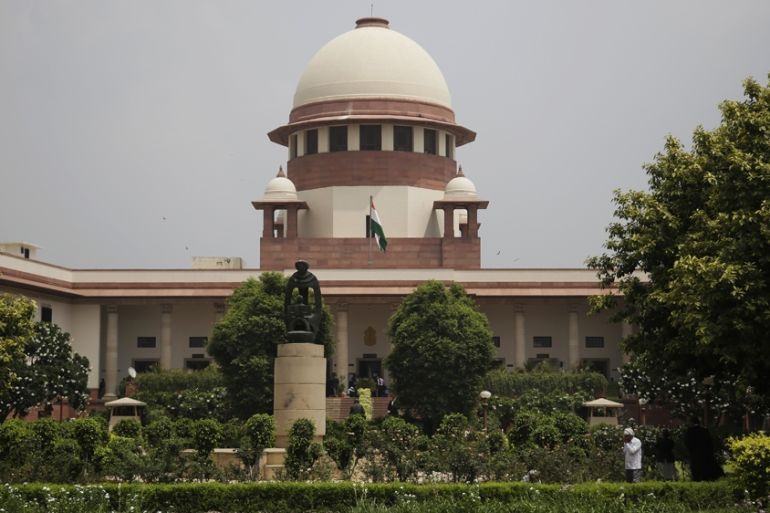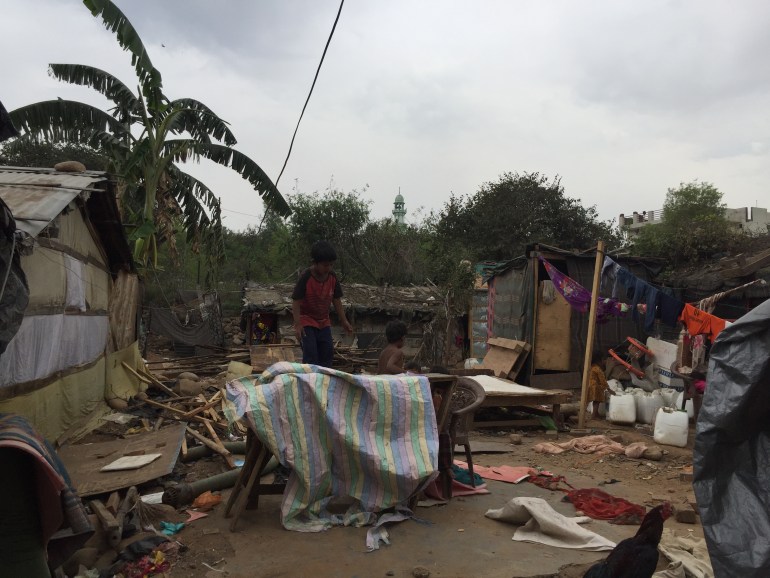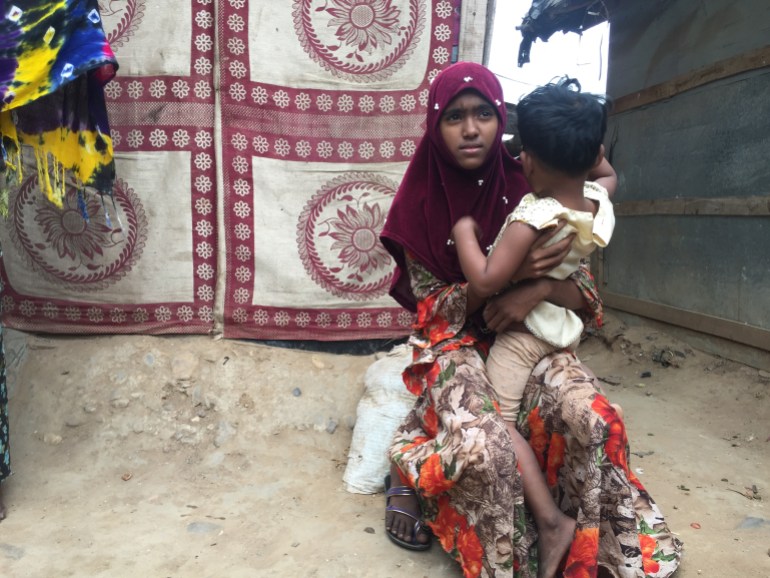‘Supreme Court has signed our death warrant’: Rohingya in India
Supreme Court refuses to stop deportation of about 170 Rohingya detained in the Indian-administered Kashmir region’s Jammu area last month.

Srinagar, Indian-administered Kashmir – India’s Supreme Court has refused to stop the deportation to Myanmar of about 170 Rohingya refugees detained in the Indian-administered Kashmir region’s Jammu area, with the members of the beleaguered community calling it a “death warrant” issued by the court.
“Possibly that is the fear that if they go back to Myanmar, they will be slaughtered. But we cannot control all that,” the top court said on Thursday, stating that the fundamental right to settle in India is available only to its citizens.
Keep reading
list of 4 items‘Setback for artistic freedom’ as India scraps film tribunal
Is India, ‘pharmacy of the world’, facing COVID vaccine shortage?
How dangerous is India’s ‘double mutant’ COVID-19 variant?
The court also underlined the Indian government’s claim that Rohingya refugees posed a “threat to internal security of the country” as it declined a petition to release the Rohingya men, women and children detained last month in Jammu.
Approximately 5,000 mainly-Muslim Rohingya had taken refuge in Jammu in the past few years after a large number of them fled a 2017 military crackdown in Buddhist-majority Myanmar – carried out with “genocidal intent”, according to the United Nations.
India hosts about 40,000 Rohingya refugees living in camps and slums in different cities and regions, including Jammu, Hyderabad, Nuh and the capital New Delhi – many of them believed to be undocumented.
Nearly 170 refugees, who had been living in camps and slums of Jammu for years, were summoned on March 6 by the local police as part of a “verification” exercise. They and many others picked up in subsequent police raids were taken in buses to a “holding centre”, as the jail in Hiranagar, 59km (36 miles) away, was called by the officials.
Indian authorities later said they were “illegal immigrants” and proceedings have begun to deport them back to Myanmar, despite the unrest there following a February 1 military coup and killing of hundreds of anti-coup protesters.
Days after the crackdown, Mohammad Salimullah, a Rohingya refugee, with the help of prominent lawyer Prashant Bhushan, filed a petition in the Supreme Court seeking directions that the government stop the deportation detained in Jammu and release them.
During the hearings in the court, Tushar Mehta, the solicitor general of India, argued the Rohingya were “illegal immigrants” and the government is “in touch with Myanmar”.
“Once Myanmar confirms their nationality, then they will be deported,” Mehta told the court.
In an earlier hearing on March 23, Bhushan presented in court an order passed by the International Court of Justice last year which stated that Rohingya faced genocidal threats in Myanmar. But the government’s counsel said “India cannot be a capital” for them.

Fear and uncertainty
Yet to come to terms with the Supreme Court ruling, the Rohingya are both shell-shocked and unsure about their future course of action.
“It is a very disappointing order given the situation in our country,” said a Rohingya activist requesting anonymity due to security fears. “In Myanmar, an elected government has been removed by the military which is accused of killing, raping our people.”
After the Indian authorities detained the refugees in Jammu, many other Rohingya fled the city, selling belongings and seeking refuge in other cities with the hope that they will not be deported back to their country.
“I have started selling whatever small things I had managed to buy from the hard work of the last five years,” said Mohammad Musheed, a 35-year-old Rohingya, who lives in Jammu’s Narwal camp with his wife and three children.
“I sold utensils and some electrical appliances so that I have some cash in hand which will help me to go to another city.”
However, the Rohingya are not welcome in even other Indian cities. In Haryana state earlier this year, police threatened some refugees who had moved in from another city of dire consequences, forcing them to go back to their camp in Jammu.
“We had huge hopes from the Supreme Court,” said Mohammad Saleem, another Rohingya refugee in Jammu. “Every court treats humans like humans without getting into their ethnicity or race. But in India, from its politicians to the judiciary, they are all treating us worse than animals.”
Indian officials say they are ready to deport the Rohingya to Myanmar and that the process is in the final stage.
“We have almost completed the process to deport them and the Supreme Court order will help us speed [up] the process,” an official told Al Jazeera requesting anonymity as he is not authorised to speak to the media.
“There is no positive response from Myanmar as there are domestic problems going on. But talks are going on with the Myanmar officials,” the official added.
Last week, India’s plans to deport a 14-year-old Rohingya girl was stalled after Myanmar’s border forces refused to accept her due to “internal disturbances” in their country.
The precarious situation of Rohingya refugees has exacerbated in India ever since Prime Minister Narendra Modi’s Hindu nationalist Bharatiya Janata Party (BJP) came to power in 2014, giving rise to negative sentiment and violence against the community.
In 2017, a local BJP leader in Jammu started a campaign demanding that all Rohingya be expelled from the region.

Divided families
More than a month has passed since 10-year-old Haleema and her three-year-old sister Noora Bibi were separated from their parents. Their father Mohammad Ibrahim, 50, who worked as a labourer, has been detained along with their pregnant mother, Sajida Bibi.
“During the nights, my sister keeps crying and asking for our mum. I keep telling her, she will come,” Haleema told Al Jazeera. “There is no one to take care of us.”
Haleema and her sister do not get to eat properly during these days. “Sometimes people give us food but at times we don’t get to eat anything,” she said.
She was allowed to see her mother once in the jail after Haseena, Haleema’s aunt, borrowed money from a neighbour to travel to the jail.
“I saw my mother through a glass barrier,” said Haleema. “For most of the time, both of us were crying. My mother was only repeating that I should take care of my younger sister.”
Haseena said Sajida is expecting to deliver her third child in two weeks. Despite raising the issue with the authorities, she has not been released on medical grounds.
The detentions have torn Rohingya families apart, leaving behind mostly unattended children and the elderly.
In such a scenario, the Supreme Court’s ruling has dealt a blow to Rohingya refugees and civil rights activists, who say the judgement leaves little or no room for legal recourse.
“The Supreme Court of India has signed our death warrant,” Saleem told Al Jazeera.